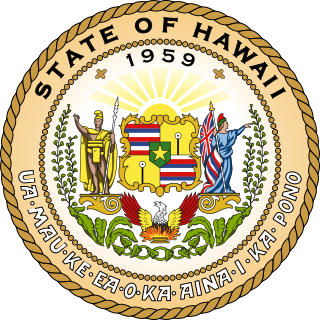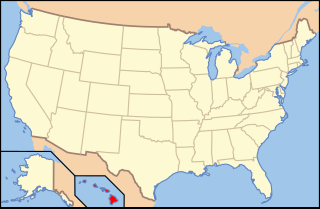Related Research Articles

A veto is a legal power to unilaterally stop an official action. In the most typical case, a president or monarch vetoes a bill to stop it from becoming law. In many countries, veto powers are established in the country's constitution. Veto powers are also found at other levels of government, such as in state, provincial or local government, and in international bodies.

Linda Lingle is an American politician, who was the sixth governor of Hawaii from 2002 until 2010. She was the first Republican governor of Hawaii since 1962. Lingle was also the state's first female and first Jewish governor. Prior to serving as governor, Lingle served as Maui County mayor, council member, and chair of the Hawaii Republican Party.

The California State Legislature is a bicameral state legislature consisting of a lower house, the California State Assembly, with 80 members; and an upper house, the California State Senate, with 40 members. Both houses of the Legislature convene at the California State Capitol in Sacramento. The California state legislature is one of just ten full-time state legislatures in the United States. The houses are distinguished by the colors of the carpet and trim of each house. The Senate is distinguished by red and the Assembly by the color green.

The Hawaii State Legislature is the state legislature of the U.S. state of Hawaii. The state legislature is a bicameral body consisting of a lower house, the Hawaii State House of Representatives, with 51 representatives, and an upper house, the 25-member Hawaii State Senate. There are a total of 76 lawmakers in the legislature, each representing single member districts across the islands. The powers of the legislature are granted under Article III of the Constitution of Hawaii. The legislature convenes at the Hawaii State Capitol building in the state capital of Honolulu, on the island of Oahu.

Mazie Keiko Hirono is an American lawyer and politician serving as the junior United States senator from Hawaii since 2013. A member of the Democratic Party, Hirono previously served as a member of the United States House of Representatives for Hawaii's 2nd congressional district from 2007 to 2013. Hirono also served as a member of the Hawaii House of Representatives from 1981 to 1995 and as Hawaii's ninth lieutenant governor from 1994 to 2002, under Ben Cayetano. She was the unsuccessful Democratic nominee for governor of Hawaii in 2002, defeated by Republican Linda Lingle in the general election.

The Hawaii Republican Party is the affiliate of the Republican Party (GOP) in Hawaii, headquartered in Honolulu. The party was initially strong during Hawaii's territorial days, but following statehood the Democratic Party took control. The Hawaii Republican Party is currently one of the weakest Republican affiliates along with the District of Columbia Republican Party.

The Alaska State Senate is the upper house in the Alaska Legislature, the state legislature of the U.S. state of Alaska. It convenes in the Alaska State Capitol in Juneau, Alaska and is responsible for making laws and confirming or rejecting gubernatorial appointments to the state cabinet, commissions and boards.

The Maryland Senate, sometimes referred to as the Maryland State Senate, is the upper house of the General Assembly, the state legislature of the U.S. state of Maryland. Composed of 47 senators elected from an equal number of constituent single-member districts, the Senate is responsible, along with the Maryland House of Delegates, for passage of laws in Maryland, and for confirming executive appointments made by the Governor of Maryland.

The Arizona State Legislature is the state legislature of the U.S. state of Arizona. It is a bicameral legislature that consists of a lower house, the House of Representatives, and an upper house, the Senate. Composed of 90 legislators, the state legislature meets in the Capitol Complex in the state capital of Phoenix, Arizona. Created by the Arizona Constitution upon statehood in 1912, the Arizona State Legislature met biennially until 1950. Today, they meet annually.

The Alabama Legislature is the legislative branch of the state government of Alabama. It is a bicameral body composed of the House of Representatives and Senate. It is one of the few state legislatures in which members of both chambers serve four-year terms and in which all are elected in the same cycle. The most recent election was on November 6, 2018. The new legislature assumes office immediately following the certification of the election results by the Alabama Secretary of State which occurs within a few days following the election.

Same-sex marriage in Hawaii has been legal since December 2, 2013. The Hawaii State Legislature held a special session beginning on October 28, 2013, and passed the Hawaii Marriage Equality Act legalizing same-sex marriage. Governor Neil Abercrombie signed the legislation on November 13, and same-sex couples began marrying on December 2. Hawaii also allows both same-sex and opposite-sex couples to formalize their relationships legally in the form of civil unions and reciprocal beneficiary relationships. Civil unions provide the same rights, benefits, and obligations of marriage at the state level, while reciprocal beneficiary relationships provide a more limited set of rights.

Electoral reform in California refers to efforts to change election and voting laws in the U.S. state of California.

House Bill 444 was a 2009 bill of the Hawaii State Legislature, passed in April 2010 and vetoed by Governor of Hawaii Linda Lingle, that would have legalized civil unions for couples in the state of Hawaii. Its legislative process was accompanied by controversy over the bill's content and effects and rallies were held by supporters and opponents.

Lesbian, gay, bisexual, and transgender (LGBT) persons in the U.S. state of Hawaii enjoy the same rights as non-LGBT people. Same-sex sexual activity has been legal since 1973; Hawaii being one of the first six states to legalize it. In 1993, a ruling by the Hawaiʻi Supreme Court made Hawaii the first state to consider legalizing same-sex marriage. Following the approval of the Hawaii Marriage Equality Act in November 2013, same-sex couples have been allowed to marry on the islands. Additionally, Hawaii law prohibits discrimination on the basis of both sexual orientation and gender identity, and the use of conversion therapy on minors has been banned since July 2018. Gay and lesbian couples enjoy the same rights, benefits and treatment as opposite-sex couples, including the right to marry and adopt.

Hawaii Senate Bill 232 is a 2011 law which legalizes state recognition of civil unions in the state after January 1, 2012. Initiated in the Hawaii Senate and substantively similar to 2010's Hawaii House Bill 444, which was vetoed by then-Governor Linda Lingle. SB232 was backed by her successor, Neil Abercrombie.

In Hawaii, the LGBT laws have been evolving for the past hundred years. In the pre-19th century, the influence of Polynesian culture led to a more open-minded state. After the first Christian missionaries began arriving in Hawaii, strict sodomy laws were enacted. Territory v. Bell (1958) was the last sodomy case argued in Hawaii. After the turn of the 20th century, LGBT issues began being taken to and decided by the Supreme Court. In 2013, Hawaii voted in favor of gay marriage, and marriage licenses began to be issued to LGBT couples.
Tommy Garrett is a politician from the U.S. state of Nebraska. In 2013, he was appointed to fill a vacancy in the unicameral Nebraska Legislature, representing a district in Sarpy County, in the Omaha metropolitan area. Garrett is a member of the Republican Party. In Nebraska, the legislature is non-partisan.
Joni Craighead is a politician from the state of Nebraska in the Midwestern United States. In 2014, she was elected to the Nebraska Legislature, representing a district in Omaha. She resigned in 2017, before the end of her term.
David Schnoor is a politician from the state of Nebraska. In December 2014, he was appointed to the Nebraska Legislature, representing a district in the east-central part of the state. He was defeated by Lynne Walz in the 2016 election. He is a member of the Republican Party.
Nicole Fox is a politician from the state of Nebraska in the Midwestern United States. She is a member of the Republican Party. In 2015, she was appointed to fill a vacant seat in the Nebraska Legislature, representing a district in downtown and southern Omaha. In 2016, she sought election to the seat and came in third in the nonpartisan primary and thus failed to advance to the general election.